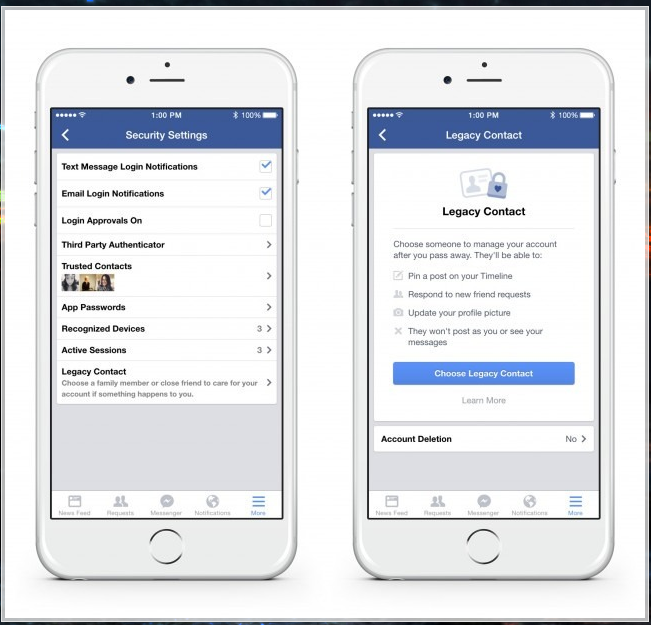Facebook introduced a new legacy contact feature — allowing users to choose who can manage their accounts once they’ve died — and it’s something we should all think about activating. There are very valuable perspectives that come only when we consider our own death, and it’s good that social media platforms are creating functions to handle it. Facebook follows Google in providing this type of posthumous functionality, other sites are sure to follow suit.
As Facebook says, “When a person passes away, their account can become a memorial of their life, friendships and experiences.” While you might initially cringe at such an option, remember: It could provide comfort to your friends and family.
Below, we provide an overview of what a legacy contact is, and what you should consider when choosing yours.
What is a legacy contact?

Image: Facebook
In Facebook’s words, a legacy contact is “someone you choose to look after your account if it’s memorialized.” Note that the feature also allows you to have your account deleted after your death.
How do I set up my legacy contact?

Image: Facebook
On the web, click the dropdown arrow at top-right of your Facebook homepage. Select Settings, then choose “Security” and scroll down to “Legacy Contact.”
From here you can manage the level of permission you want to set and have the option to send a message to your chosen person.
Who should I choose?
This is a very personal question we all need to ask ourselves.
Your legacy contact will only have limited access to your account, and will not be able to read messages, but he or she will have the power to pin posts to the top of your Facebook page, respond to friend requests, and change your profile and cover photo. If you grant permission, your legacy contact will also be able to download your posts and photos.
Facebook lets you designate anyone your legacy contact, but your contact needs to be on Facebook. This will rule out parents and family members who aren’t on the social network — then again, those who aren’t particularly digitally savvy might not be up for the task anyway.
A friend or significant other is a plausible choice, but you have to be 100% sure the person you choose is ready for the responsibility — there is no way for your legacy contact to delegate the task once you’ve passed away. It’s also important to consider someone you know you’ll stay in touch with for many years to come.
For anyone lucky enough to have them, a sibling or close cousin might work well. Family is (theoretically) less likely to shirk the responsibility, and if they’re close in age, chances are they’re digitally clued in and already on Facebook.
Lastly, WSJ reports that if you’ve already appointed a “digital heir” through your existing legal will and testament, that person will be designated as your legacy contact via that method.
What happens to my account if I ask my legacy contact to “memorialize” it?

Image: Facebook
Your legacy contact needs to get in touch with Facebook and make a valid request to have your account memorialized or removed via an online form.
If you choose to have your legacy contact memorialize your account, it will stay live, but will have a “Remembering” label before your name, as shown in Facebook’s sample screenshot above.
Nothing from your account will ever appear in a News Feed and no ads will be shown next to your page. It would simply become a static, online destination where your friends and family can go to remember you.
Have something to add to this? Share it in the comments.


